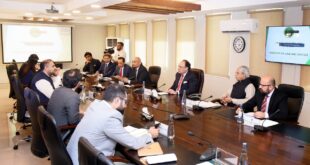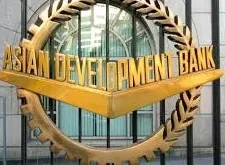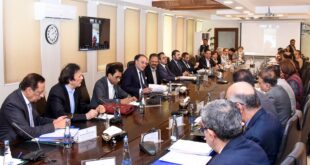
Finance Minister Muhammad Aurangzeb has emphasized that industrialists and traders play a vital role in the country’s development, asserting that the ultimate goal is to benefit the common man. He stated that once Pakistan achieves self-sustainability, the current loan program from the International Monetary Fund (IMF) will be the last. He also mentioned that more good news would be announced by the Prime Minister in the coming months.
Speaking at a press conference following a meeting with industrialists at the Lahore Chamber of Commerce, the Finance Minister said that Prime Minister Shehbaz Sharif is personally leading efforts on taxation matters. He expressed confidence that resolving revenue and energy issues will lead the economy toward improvement.
Aurangzeb addressed concerns regarding corruption and bribery, urging people not to view such issues from a one-sided perspective. “It takes two to clap,” he said, noting that if government officials are taking bribes, someone is also offering them. He appealed to the business community to support the government by refusing to engage in bribery. He also pledged that the Federal Board of Revenue (FBR) would be staffed with officers known for their integrity and professionalism.
He pointed out that 80% of income tax is paid by the salaried class, whose tax is automatically deducted once their income is deposited into their accounts. Despite this, they are still required to visit offices, where they are often advised to mark forms as “non-applicable.” He questioned who would resolve matters if such declarations caused issues later. To address this, he announced the introduction of a simple online tax form that salaried individuals could fill out via mobile phone, aiming to resolve their tax concerns more efficiently.
The Finance Minister highlighted that State-Owned Enterprises (SOEs) are incurring collective losses between Rs 800 billion and Rs 1 trillion. The government has decided to privatize 24 of these entities. Responding to recurring questions about spending on health and education, he said the answer lies in reducing losses in other sectors; only then can more be allocated to essential services like healthcare and education.
He further explained that the concept of “faceless customs” would now be implemented with the integration of advanced technology. He noted that unless human involvement is minimized, even appointing the most competent individuals will not solve systemic issues.
Aurangzeb urged people to show resilience and shared a recent incident where an individual told him they had received a refund but were asked to pay a percentage. When they resisted, the officer allegedly replied, “Ministers like him come and go—we have to deal with the same officials.” The person eventually paid the bribe. The minister implored citizens to resist such practices and remain hopeful, assuring them that positive change is coming.
He announced that the privatization of Pakistan International Airlines (PIA) would soon resume, noting that the national carrier has moved from a state of loss to profitability.
Addressing broader issues, Aurangzeb pointed out that population growth and environmental challenges are escalating. He noted that the birth rate in rural areas is significantly higher than in urban centers, raising concerns about the country’s future if the trend continues. He also highlighted the growing number of out-of-school children and stressed the need to focus on structural reforms.
He remarked that environmental problems have made living in cities like Lahore increasingly difficult. He urged collective responsibility in addressing climate change and called for cooperation with the Punjab Chief Minister’s climate initiatives to reduce environmental degradation.
The Finance Minister also reported a decline in inflation, with the interest rate falling from 22% to 12%. He said this reduction in the policy rate is helping to stabilize businesses. Emphasizing again that the primary goal is to benefit the common man, he stressed the importance of increasing exports, with every sector needing to contribute.
He stated that economic stability depends on controlling inflation and that the government is reviewing prices of essential goods such as pulses and sugar on a daily basis. He affirmed that the drop in inflation must translate into relief for the public.
In response to a question, Aurangzeb referred to the Reko Diq project as a major national initiative. He expressed optimism that Pakistan’s exports would rise after 2028. He noted that the Reko Diq project in Balochistan is a national aspiration, citing Indonesia’s $22 billion export of nickel last year as a benchmark. He projected a similar boost for Pakistan’s exports post-2028.
 BeNewz
BeNewz




